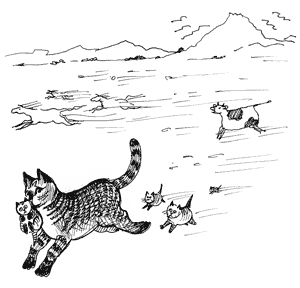STRANGE BUT TRUE- Pet prognosis: Animals know what's coming

DRAWING BY DEBORAH DERR McCLINTOCK
Q. The village cats are leaving with their kittens, horses are stampeding, cows are breaking out of barns, rats are roaming the streets in broad daylight, birds are singing at the wrong time of day? What's gotten into them? –G. Gebel-Williams
A. Such behaviors have been reported for centuries as precursors to earthquakes or volcanic eruptions, says zoologist John Downer in Supersense. The animals may sense electrical changes in the air as rocks are stressed. Birds and elephants may hear the low-frequency rumblings– inaudible to humans– of a quake on the way; snakes, keen to surface vibrations, may feel the tiny pre-tremors.
Dogs too have this sort of emergency ESP– Extra-Sensitive Perception– and stories abound of their heroism in wresting their special people out of bed before an earthquake or tornado hits, says Exploring magazine. Untrained dogs have also been known to warn their epileptic masters of an imminent seizure, up to an hour in advance and by one tally of family members, with 97 percent accuracy!
Q. If your dreams have been troubling you lately, why not try rewriting the scripts? –R. Norment
A. Plagued by nightmares of falling out of a skyscraper window or off a cliff, John P. Dworetzky tells in Psychology of using a relaxation technique at bedtime to implant an empowering thought: "If I or someone I love falls, it's okay, because I'm Superman."
A few nights later, he dreamed he was walking along a cliff edge and began to fall. Panic struck, his heart raced, but then he remembered, "Oh yeah, I'm really Superman." Dworetzky started to fly and found it very pleasant. He even started looking forward to these dreams, but soon they stopped. "I suppose I decided somewhere deep in my mind that falling was no longer something I needed to deal with... I almost never have nightmares now."
Drawing on this dreams-control approach, a TV comedian once joked that he was always being chased by some nightmare guy until confronting him one night: "Hey! I'm dreaming you, so if you kill me, where does that leave you, wise guy?" Now, said the comedian, when the pursuer catches up, he just talks about how tired he is and how fast a runner the comedian is.
"The real joke, of course," says Dworetzky, "is that it sounds like something that might actually work!"
Q. You know the Roman numerals for 1-10 are I, II, III, IV, V, VI, VII, VIII, IX, X. What about for 0? –J. Brinkley
A. Forget zero in the Roman system. Zeroes were relative latecomers, introduced in India in the 2nd century B.C., says Richard Phillips in Numbers: Facts, Figures & Fiction. People counted 1, 2, 3... long before they realized that having nothing to count should also be represented by a number. The real power of zero is for place-value, so a number like 6 can also signify 60 minutes or $6,000 or 6,000,000,000 people in the world.
We still often hesitate to think of zero as a number, says Biola University mathematician Walt Stangl. "After all of the cookies are eaten, how many of us would say there are zero left? If asked, we more commonly say there's none," he says.
Q. How would you like to write down something nobody has ever written before and never will. It'll take only five minutes. Interested? –A.N. Kolmogorov
A. With a 6-sided die, roll 50 numbers, such as 3466346362 1632143466 3344524342 2653364263 1152454334, and you've just created a sequence that no one has ever created before, says Jeffrey Rosenthal in Struck by Lightning: The Curious World of Probabilities. In fact, if all of the 100 billion people who ever lived spent their entire lives rolling such numbers once per minute, the likelihood of anyone ever hitting your number would be less than 1 chance in a 1 followed by 20 zeros. If the CIA had a million computers producing a billion sequences a second, it would take 250 trillion years to have even a 1 percent chance of hitting it!
To figure the number of different sequences, all equally probable, multiply 6 times itself 50 times– or approximately 8 followed by 38 zeros. Uniqueness guaranteed! But don't try just making up the numbers, because hidden bias will sacrifice randomness. A fun Internet test is to make up a short sequence like 325794 and Google it; you'll probably get some hits, but not when you go to 10 numbers or more.
And it's not just numbers sequences. "Consider all the random choices you make every day, from what you eat for breakfast to what you say to the subway attendant on your way to work, etc." You are you and nobody else even comes close. Life's randomness guarantees it!
Send Strange questions to brothers Bill and Rich at [email protected].